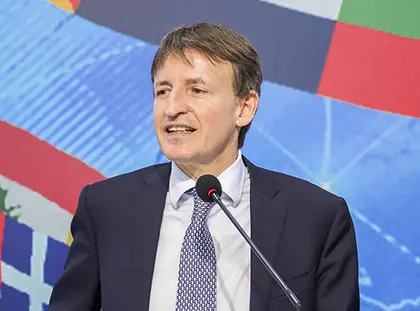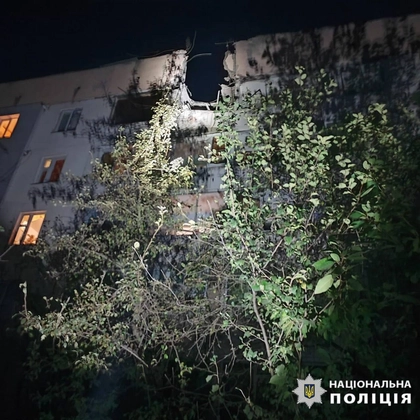Ambassador Zazo, the Italian embassy was the last EU embassy to leave Kyiv, as well as one of the only two embassies of the EU, along with France, to remain in Ukraine permanently, in a temporary office in Lviv. Why such a dangerous choice when other embassies had immediately left. How did Ukrainian officials view this decision?
It was largely a forced choice. In the weeks preceding the Feb. 24 invasion, we had sent letters to our compatriots urging them to leave the country. However, the fact is that 90 percent of the 2,000 or so Italian nationals in Ukraine stayed. They didn’t believe in the possibility of war.
JOIN US ON TELEGRAM
Follow our coverage of the war on the @Kyivpost_official.
So, on Feb. 24, dozens and dozens of compatriots poured into the embassy, many with children and babies. The immediate instruction I received from the Italian government was to stay and bring them safely into the residence, where we hosted up to 150 Italians. We then organized four evacuations with convoys, two with the OSCE [Organization for Security and Co-operation in Europe], one with the help of the French and Belgians and one that also included me.
From Kyiv we moved to Lviv. We never left the country. Then we were the first to return to Kyiv, along with the French.
Ukrainians tell us that they greatly appreciated Italy and France’s choice, the only G7 countries never to leave the Ukrainian territory. Also because they interpreted it as a sign of solidarity, closeness to the Ukrainian government and people.

South Korea Demands 'Immediate Withdrawal' of North Korean Troops in Russia
It also made it easier for us in terms of work, because in the month during which I was in Lviv, a large part of the Ukrainian government and parliament had actually moved to Lviv as well. So, there were very few of us ambassadors, and we had privileged access to government members.
It also allowed us to better organize the evacuation of the Italians stuck in Ukraine; and better manage the first contacts with NGOs, humanitarian organizations, and international bodies.
Even today, more than a year later, the Ukrainian authorities thank us for this.
Ambassadors normally rotate and rarely return to the same post. But your case is different. You had already been to Ukraine several years ago. And what is especially relevant, you’ve also had some work experience for the Italian government at their Moscow embassy. So, you know the counterpart, unfortunately, of this war, too. Could you elaborate on these three different experiences?
It was certainly an advantage for me. I had already been in Kyiv from 1999 to 2002, but I must say, it was a different Ukraine.
Then I was in Moscow from 2002 to 2006. I speak Russian, and knowing both countries certainly helped get a better understanding of what was happening. I can say definitely that I found a very changed Ukraine 20 years later.
I remember [Samuel] Huntington’s essay, “Clash of Civilizations.” At the time Ukraine was truly a country split in two. That is, western Ukraine looked toward Europe; it had been part of the Austro-Hungarian Empire and experienced Polish domination. Whereas eastern Ukraine definitely looked toward Russia.
Coming back after 20 years later I found a changed country. Young people look toward the West, toward Europe, they speak English. The association and free trade agreement between the EU and Ukraine entered into force in 2017, with the liberalization of visas. An independent [canonically recognized] Ukrainian church grew in this period. This country has definitely become more pluralistic.
Remember that in 30 years of independence, Ukraine has had six presidents. But the element that struck me most, which I immediately observed and clearly perceived, is a marked strengthening of the Ukrainian national identity, which did not exist 20 years ago. It struck me above all in the first trips I made to Odesa, Kharkiv, and Dnipro in eastern Ukraine, where the Ukrainians continue to speak Russian. By now they feel Ukrainian. In other words, being a Russophone does not mean being a Russophile, that’s the first thing that struck me.
And yet, I would watch Russian TV and saw that they were describing a completely different country from the one I was seeing.
“Italy has played a leading role in recognizing Ukraine as a candidate country for the EU.”
What about the relationship between Italy and Ukraine? Italy, both with the previous Mario Draghi government and now with the Giorgia Meloni government, has stood by Ukraine. This relationship of solidarity and support has given you a prominent role as an ambassador. What are the things that you are particularly proud of? And what’s next on your agenda?
Relations today are excellent. We are giving 360-degree support at the political, economic, military and humanitarian level – whether bilaterally or multilaterally. Since Feb. 24, [2023] – which was a shock also for the Italian public – the Ukrainians has been very grateful to us. Even before that, they looked at us with great sympathy, because we have a large Ukrainian community that integrates very well into Italy.
There is a feeling of affinity and friendship between our two peoples, but at a political level they really consider us to be standing by them. I’m particularly happy and proud of the fact that Italy has been at the forefront in convincingly supporting the need for Ukraine’s European aspirations. Italy has played a leading role in recognizing Ukraine as a candidate country for the EU. And there are high Ukrainian expectations that Italy will be among the large European countries most willing to wholeheartedly back the integration of the Ukrainian economy into that of the EU and, above all, expect a green light from us with regard to the rapid start of negotiations for accession to the EU.
Above all, since we are the third largest economy in the EU, they expect us to play a leading role in the country’s economic reconstruction efforts. In this regard, I’ll remind you that already before the war, Italy was Ukraine’s third-largest European commercial partner – after Germany and Poland. The trade was considerable and there is definitely an enormous potential, because we have two complementary economies.
We have identified the main sectors, obviously those in which Italy is notably strong: machinery, Made in Italy, etc. But we have also identified agro-industrial, where we are truly a world power, as well as renewable energy, infrastructure, space, digital, and even the defense industry. Yes, there are many sectors where there will be a lot to do for Italian companies, and there is huge potential interest.
Obviously, the war is still ongoing, but there was the Conference in Rome [Apr 26, 2023] with the participation of over 700 Italian and 150 Ukrainian companies. Another important aspect: we will soon open an office of AICS, the Italian Agency for Development Cooperation. It’s also very important to guarantee this connection between the quick recovery, because the Ukrainians expect aid even now. And Italian cooperation will be able to guarantee the connection with the subsequent phase, which is that of economic reconstruction, where there are high expectations of us.
With regard to diplomatic relations, despite the war, it seems to me that there have been some steps forward, including the appointment of diplomatic representatives of Italy in the country, such as honorary consulates.
Our idea is to try to create a network of honorary Consuls, especially Ukrainian entrepreneurs, because it is very important to create a network, which will be fundamental in the next phase, after the war, since we are talking about a very large country. And having a network of honorary consulates will above all allow us to strengthen relations in the economic and commercial field.
In this phase we are also supporting the signing of twin-city agreements. For example, Odesa and Genoa are already twin cities. An agreement has also been signed between Odesa and Venice. Regions too. In a few days an agreement will be signed between the Tuscany Region and the Kyiv Region. At the Italian national day celebration, I met the mayor of Bucha, who is very happy with how the twin-city agreement with Bergamo is going, because it is very important that future aid for economic reconstruction is not directed only to Kyiv, but to all of Ukraine. Here too, there is the Ukrainian wish that there might be an Italian presence not only on the part of companies, but also of the Italian municipalities.
Thank you, Ambassador Zazo for giving us this time in your private residence here in Kyiv.

Italian ambassador to Ukraine Pier Francesco Zazo.
You can also highlight the text and press Ctrl + Enter






